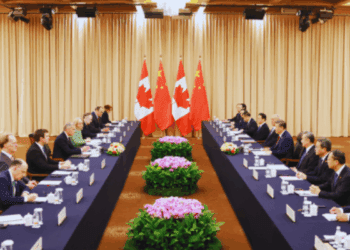This article originally appeared in Troy Media.
By Shawn Whatley, April 5, 2024
Canadian conservatives – particularly these days under Pierre Poilievre’s federal leadership – say they embrace freedom, free enterprise, and limited government. But too often, conservatives at the federal and provincial levels have abandoned these intellectual commitments in office. Their past and ongoing support for central planning in healthcare is a good example.
Canada’s healthcare system is marked by a government monopoly on certain types of insurance and similar top-down restrictions on the delivery of healthcare itself. Conservative governments across the provinces have been unwilling to liberate Canadians from this dirigiste model.
Ontario Premier Mike Harris’s healthcare restructuring in the late 1990s best demonstrates the paradoxical relationship between Canadian conservatives’ theoretical commitment to freedom and their practical affirmation of central planning in healthcare.
Will Falk, a former management consultant, recently wrote a detailed review, analysis, and scorecard of the Harris government’s healthcare agenda in a new anthology about the premier’s record entitled The Harris Legacy. Falk’s focus is the government’s Health Services Restructuring Commission (HSRC) and its effects on the province’s overall system and patient outcomes. He writes:
The Harris health program represents exceptionally well-done central planning. This is striking and ironic because a true ‘revolutionary’ of the ‘common sense’ school should not believe in central planning at all … Mike Harris ended up being among the best healthcare central planners in Canada’s history.
As Falk observes, though the Harris Conservatives were generally quite committed free marketeers (he notes, for instance, that many young staffers were acolytes of the Nobel Prize-winning and libertarian economist Friedrich Hayek), the government’s healthcare policy preached freedom but actually practiced coercion. He explains:
As neoconservative revolutionaries, the CSR’ers ‘should’ have chosen an allocative method that would allow for freedom of choice … Instead, in 1995, the Harris government imposed a highly coercive, expert regime. The HRSC central planners closed over 40 beloved institutions. More than 20,000 workers had their jobs disrupted.
Falk leaves no doubt in his conclusion: “It is ironic that Mike Harris is accused of being a free market advocate in healthcare while overseeing one of the best central planning processes in Canadian history.”
Reading Falk’s description of the Harris government’s healthcare reforms got me thinking about the two forms of Keynesian thinking that came to influence post-Second World War public policy and remain with us today.
The first form is John Maynard Keynes’ economic thinking, which included the rather banal idea that governments can help smooth the ups and downs of the business cycle in a market economy. One can argue, for instance, that the Harper government’s fiscal stimulus in response to the 2008 global financial crisis broadly followed Keynes’s counter-cyclical prescription.
The second is from Keynes, the philosopher, whose technocratic ideas became something of a “generalized theory” – particularly after his death. What is sometimes described as “bastardized Keynesianism” became a justification for all types of state intervention in the economy and society. His views about business cycles, which were contingent and narrow, were moulded and shaped into a scientific socialism that was subjected to virtually no constraints.
We came to abandon parts of economic Keynesianism in the post-stagflation era in the 1970s. However, the “bastardized” parts remain prevalent in public policy thinking and practice, including in parts of Canadian healthcare.
Free enterprise offers the best way out of a socialist slough. It worked well in the era of Reagan and Thatcher. It should work for Poilievre if he’s elected prime minister.
But will conservatives affirm freedom in healthcare and abandon the bastardized Keynesianism that still prevails today?
One possible answer can be found in a recent interview with Hub contributor Ginny Roth, in which she said:
When Conservatives are losing, sometimes it’s tempting to opt out of the policy conversations that we think we are losing on. Provincially, this always happens: ‘Don’t talk about healthcare and education. Conservatives lose when we talk about healthcare and education.’
This instinct to “opt-out” may be viewed by political strategists and the politicians they advise as good short-term politics. But the long-term result is to effectively abdicate public policy to their political opponents. What’s the point of winning if you’re simply going to implement the other side’s priorities?
If conservatives are genuinely committed to freedom and free enterprise, then they should propose legislative and policy changes to the healthcare system that foster more freedom (including competition and choice) and reject the central-planning instinct inherent in Keynesianism.
Put differently, conservatives have only two realistic options. They can opt out of the healthcare discussion and cede the terrain to progressives, or they can apply their principles to a much-needed reform agenda. They must, in the interests of Canadians and their well-being, choose the latter.
One key area for policy reform is to insist on greater provincial autonomy and interprovincial competition and experimentation. This requires clarity on federal-provincial healthcare mandates and a restraint on federal spending powers – including even something as bold as a constitutional amendment to limit it on a permanent basis.
Regardless of their approach, the federal Conservatives face a wide-open field when calling for market-friendly universal healthcare. No other party will steal their platform. They should resist, therefore, the temptation to match the Liberals on boutique health policies and instead fight for policy freedom in Canada’s most heavily regulated industry. At its core, this means granting clinicians and patients the freedom to build their own solutions safe from regulators and planners.
Poilievre has offered three cheers for freedom. He doesn’t sound like a Keynesian planner. Let’s hope he expresses the same enthusiasm for freedom in health policy.
Shawn Whatley is a physician, past president of the Ontario Medical Association, and a Munk senior fellow at Macdonald-Laurier Institute. He is the author of When Politics Comes Before Patients – Why and How Canadian Medicare is Failing.






